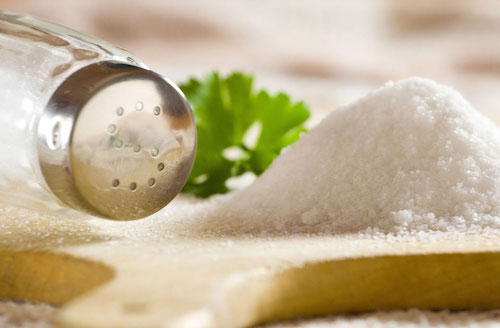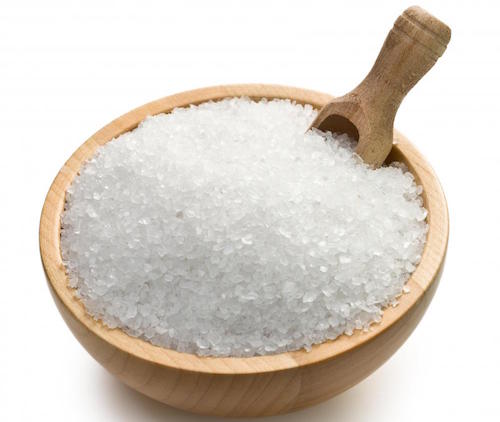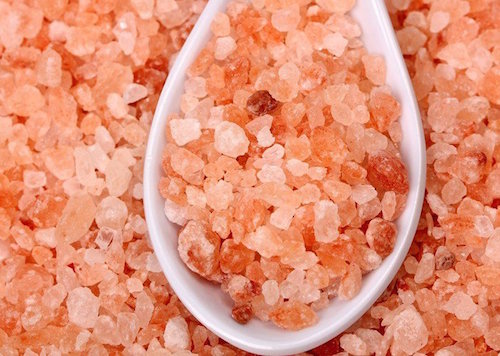 Eat Empowered
Eat Empowered  Healthy Eating Tips
Healthy Eating Tips
The Need-To-Know Facts on Salt in Food
Home » Eat Empowered » Healthy Eating Tips » The Need-To-Know Facts on Salt in Food
Q: How much salt is too much salt in food, and should I sprinkle on a specific kind?
A: There’s a reason we say good people are “the salt of the earth” and reliable people are “worth their salt.”
Salt, or sodium chloride, is a valuable mineral. It’s an essential nutrient the human body cannot make itself and plays a role in nerve and muscle function as well as regulating the body’s water content. (No wonder your taste buds perk up every time a pretzel touches your tongue, right?) Salt deficiency can lead to dehydration, low blood pressure, and yes, even death. Don’t let that scare you though, because the majority of Americans consume way too much salt in their daily diets, leading to an increased risk of high blood pressure and heart disease.
So, how much is too much salt in food?
The Dietary Guidelines for Americans recommend limiting your daily intake of salt in food to 2300 mg, which is a little less than one teaspoon. Keep in mind that that number is an upper limit—you can take in much less and be totally healthy, and other sources, like the American Heart Association, recommend an ideal limit as low as 1500 mg per day.
But what if I mortgaged my house to buy magical Himalayan Sea Salt?
There are a few different kinds of salt, and some are touted as healthier than others. Here are the main differences I think are important:

Regular Table Salt is sourced from soil and has its minerals removed through heavy processing. Then, it’s loaded with additives to prevent the granules from clumping. Iodine, the only mineral not naturally found in sea salt, is also added. Iodine controls the release of hormones and deficiency can lead to weight gain and fatigue, as well as neurological, gastrointestinal, and skin issues, but if you are eating a balanced diet that contains whole foods like fruits and vegetables, whole grains, healthy fats, and seafood, you’ll already get adequate amounts. (And the salt added to packaged foods is not even the iodized kind.)

Sea Salt, on the other hand, is exactly what it sounds like—salt from the deep, blue sea. Ocean water is evaporated leaving behind the salt, which contains trace amounts of minerals in varying amounts (depending on where it’s from). These different minerals can add a variety of flavors to your salt shaker and also result in a coarser texture. I consider sea salt to be the healthier option because it’s the least processed.

Himalayan Sea Salt, finally, is an unrefined salt that is hand mined from ancient salt caves (and is usually pretty in pink). Proponents say it contains more than 80 trace minerals that are good for you, but most experts agree they’re not present in high-enough amounts to actually affect your health. Again, it’s unprocessed, unlike table salt, so that’s a good thing, but it’s also outrageously expensive compared to regular sea salt or table salt.
A grain (or three) of advice
Keeping all of that in mind, I present you with a salt solution: Get your minerals primarily from a whole-food diet filled with vegetables, whole grains, and seafood. Avoid packaged foods as much as possible, as they tend to be super salty (canned soups are particularly bad, even the organic ones!), and minimize salt at restaurant meals by avoiding the salt shaker since they are already salty enough. In other words, cooking for yourself at home will naturally lower your salt intake. For flavor, shake on a little bit, but try to stay below the recommended daily amount. And don’t stress over the different kinds. In the end, they’re all sodium chloride, and choosing one over the other will not have a major effect on your overall diet.
The Nutritious Life Editors are a team of healthy lifestyle enthusiasts who not only subscribe to — and live! — the 8 Pillars of a Nutritious Life, but also have access to some of the savviest thought leaders in the health and wellness space — including our founder and resident dietitian, Keri Glassman. From the hottest trends in wellness to the latest medical science, we stay on top of it all in order to deliver the info YOU need to live your most nutritious life.
RECENT ARTICLES

Want a sneak peek inside the program?
Get FREE access to some of the core training materials that make up our signature program – Become a Nutrition Coach.
Get Access"*" indicates required fields













































































































































































































































































































































































































































































































































































































































































































































































































































































































































































































































































































































































































































































































































































































































